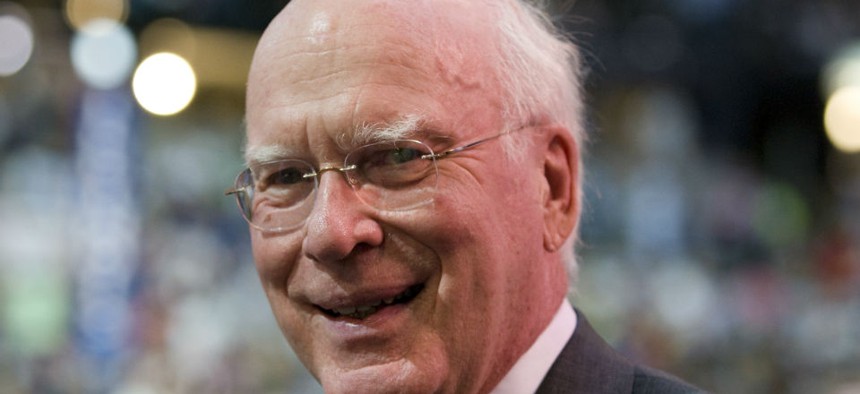
Senate Judiciary Chairman Patrick Leahy spent months updating the USA Freedom Act, but it probably won't get a vote before the midterms. Flickr user studio08denver
NSA Reform Will Likely Have to Wait Until After the Election
Legislation looks destined for a lame-duck session of Congress—and might not get touched at all until next year.
A bill that would curtail the government's broad surveillance authority is unlikely to earn a vote in Congress before the November midterms, and it might not even get a vote during the postelection lame-duck session.
The inaction amounts to another stinging setback for reform advocates, who have been agitating for legislation that would rein in the National Security Agency ever since Edward Snowden's leaks surfaced last summer. It also deflates a sudden surge in pressure on Congress to pass the USA Freedom Act, which scored a stunning endorsement from Director of National Intelligence James Clapper last week.
The hard-fought bill has a wide array of backing from tech companies, privacy and civil-liberties groups, the White House, and even the intelligence community. But multiple sources both on and off Capitol Hill say the measure is not a top legislative priority on a jam-packed Senate calendar filled with other agenda items, including unresolved fights over a continuing resolution and the Import-Export Bank.
"Extremely unlikely," one Senate staffer said when asked whether the bill would be considered in September.
The failure to move on NSA reform doesn't stem from a lack of effort. Senate Judiciary Chairman Patrick Leahy spent months updating the USA Freedom Act, an omnibus reform package originally authored by Rep. Jim Sensenbrenner that passed the House back in May. Amid complaints from the tech lobby and privacy groups alike that the House version was too weak, Leahy introduced a souped-up version of the bill in July, just before Congress broke for the summer recess.
The bill would effectively end the government's bulk collection of phone metadata—the numbers and time stamps of calls but not their actual content. Phone companies such as Verizon would instead retain those records, which intelligence agencies could obtain only after being granted approval from the Foreign Intelligence Surveillance Court. The bill would also usher in a host of additional privacy and transparency measures, including a more precise definition of what can be considered a surveillance target.
Leahy's offering debuted with wide fanfare, with cosponsors ranging from tea-party hero Sen. Ted Cruz to liberal stalwarts such as Sens. Edward Markey and Chuck Schumer. But Senate Majority Leader Harry Reid has given no indication he wants to shepherd the complicated bipartisan bill through his chamber so close to the midterm elections. Reid's office did not comment for this story, but even some reform advocates privately conceded that the political calculus to pass a bill perceived as weakening the intelligence agencies is unfavorable at a time when national security concerns are rising in the Middle East and elsewhere.
But beyond the calendar squeeze and geopolitical tensions, the Freedom Act has never had a clear path forward. It was not embraced by defense hawks such as Senate Intelligence Committee Chairwoman Dianne Feinstein or Sens. Ron Wyden and Mark Udall, who have become icons of the surveillance-reform movement. The two Democrats said they wanted to strengthen the bill to require warrants for "backdoor" searches of Americans' Internet data that can be incidentally collected during foreign surveillance hauls. Sources indicated that their support for the Freedom Act remains a bridge too far.
"We were told to go after Republicans," one industry said.
Wyden and Udall's reticence to publicly back Leahy's bill may stem from a conviction that they can get a better deal next Congress, with Section 215 of the USA Patriot Act—the legal underpinning for the NSA's phone-records collection—due to expire on June 1, 2015.
But many see an NSA reform debate that rolls into next year as no sure bet, regardless of what party holds control of the Senate.
"If the USA Freedom Act is not passed this Congress, we are really in uncharted territory, and the process has to start all over again," said Harley Geiger, senior counsel at the Center for Democracy & Technology, a pro-reform group. "All the elements for reform are in place now, but it just happens that we don't have much time."
(Image via Flickr user studio08denver)







